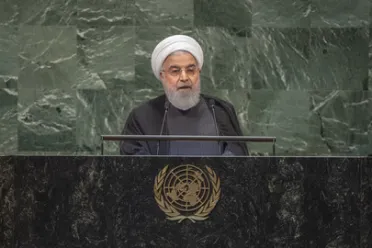Statement
Statement summary
HASSAN ROUHANI, President of Iran, said the world is suffering from recklessness and some States’ disregard for international values and institutions. The idea that peace and security can be secured at the cost of denying it to others is an illusion that should be cast away. “Confronting multilateralism is not a sign of strength; rather, it is a symptom of weakness of intellect,” he stated, adding that those who seek dominance and hegemony are enemies of peace.
The current administration of the United States seems determined to render all international institutions ineffectual, he said. Pointing out that that country’s withdrawal from the nuclear accord contravened international law, he emphasized that any further talks should take place within the framework and in continuation of the Joint Comprehensive Plan of Action and Security Council resolution 2231 (2015). “It is ironic that the [United States] Government does not even conceal its plan for overthrowing the same Government it invites to talks,” he added.
Reaffirming his respect for the non‑proliferation treaty and the long negotiations with the permanent five members of the Security Council plus Germany, known as the P5+1, that led to the Plan of Action, he said he was pleased that the international community did not acquiesce to the United States’ unilateral and illegal withdrawal from the accord. He recalled that the Plan of Action was unanimously approved by the Security Council, and that all countries and international and regional organizations were called upon to support its implementation.
Underscoring that Iran has thus far complied with all its commitments according to the International Atomic Energy Agency (IAEA), he criticized the United States for resorting to a flimsy excuse to justify its withdrawal from the accord and pressuring other countries to violate it. He deplored that the United States threatens countries and international organizations with punishment if they comply with Security Council resolution 2231 (2015). He expressed appreciation for the efforts of the international community, the European Union, Russian Federation and China in supporting the implementation of the Plan of Action.
“Unlawful unilateral sanctions in themselves constitute a form of ‘economic terrorism’,” he underscored. The policy of engagement and cooperation with Iran has produced a positive outcome, he added, drawing attention to Iran’s cooperation with other countries in the fight against terrorism. While acknowledging that, at the end of the day, there is no other way than dialogue, he expressed objection to the United States’ bullying and stressed that no State or nation can be brought to the negotiation table by force. International security should not be a toy used in United States domestic politics, and dialogue can restart if “threats and unjust sanctions that negate the principle of ethics and international law” are ended, he said.
Recalling that Iran has been a victim of terrorism in the past and again recently, he expressed commitment to the fight against the scourge no matter who the victims are. He warned against any foreign intervention in Syria and Yemen, and emphasized that the crisis in these countries can only be resolved through internal dialogue. The most pressing question in the Middle East remains the situation in Palestine, he stated, adding that “the passage of time cannot and must not justify occupation”. Citing “the recent enactment of the racist Jewish State law” as a manifestation of apartheid, he said Israel presents the most daunting threat to global peace.
He described Iran as a “meticulous guardian for a world free from violence” and called on those present to “quit imposing sanctions and end extremism”. “The world will not have a better friend than Iran if peace is what you seek,” he concluded.
Full statement
Read the full statement, in PDF format.
Photo

Previous sessions
Access the statements from previous sessions.
